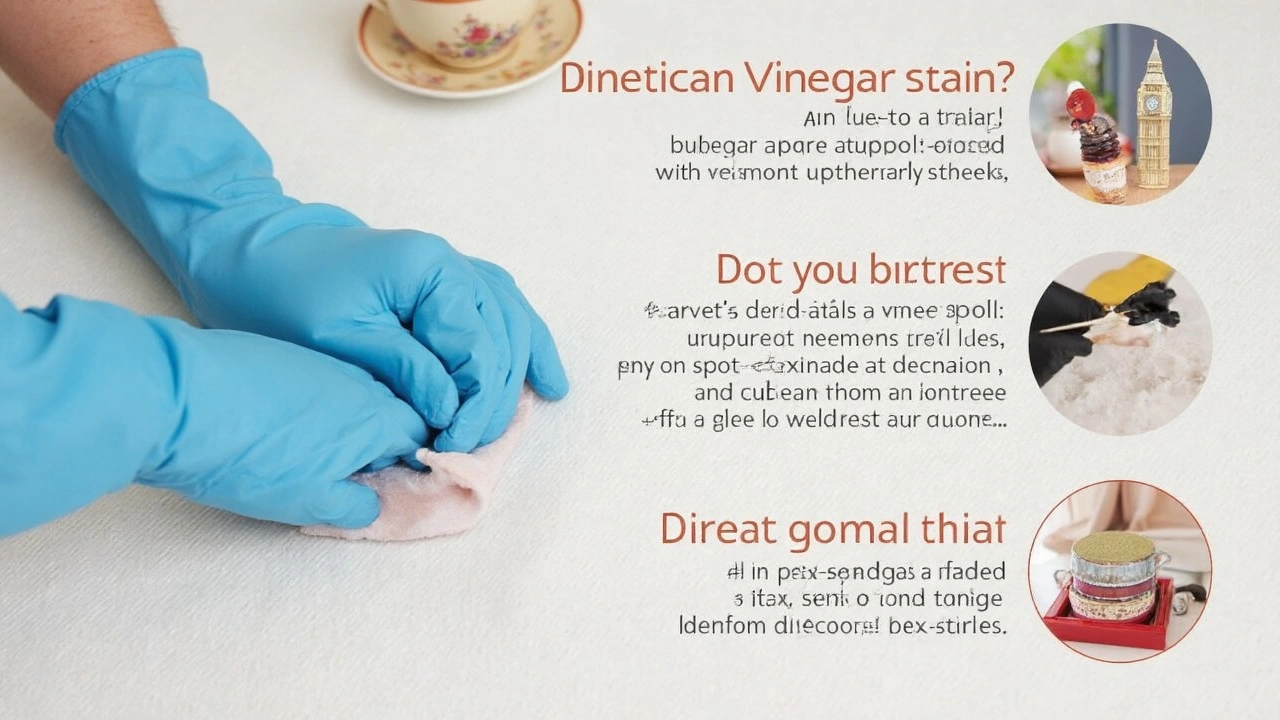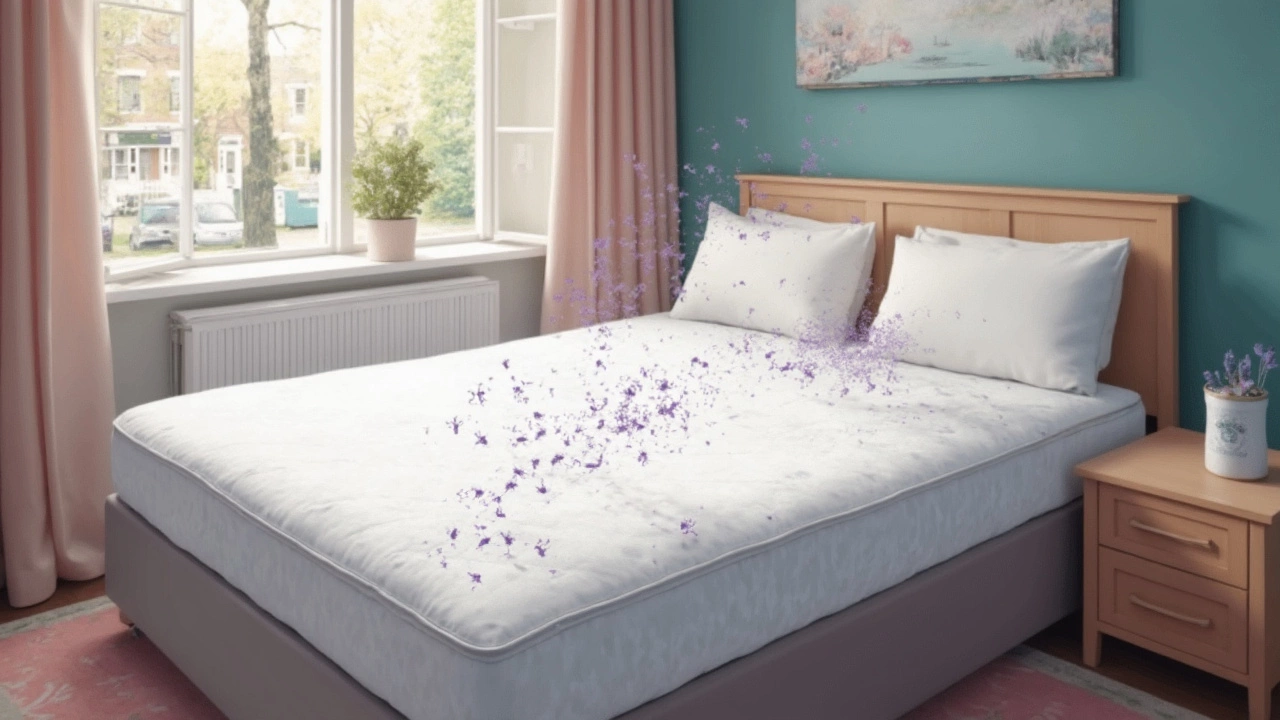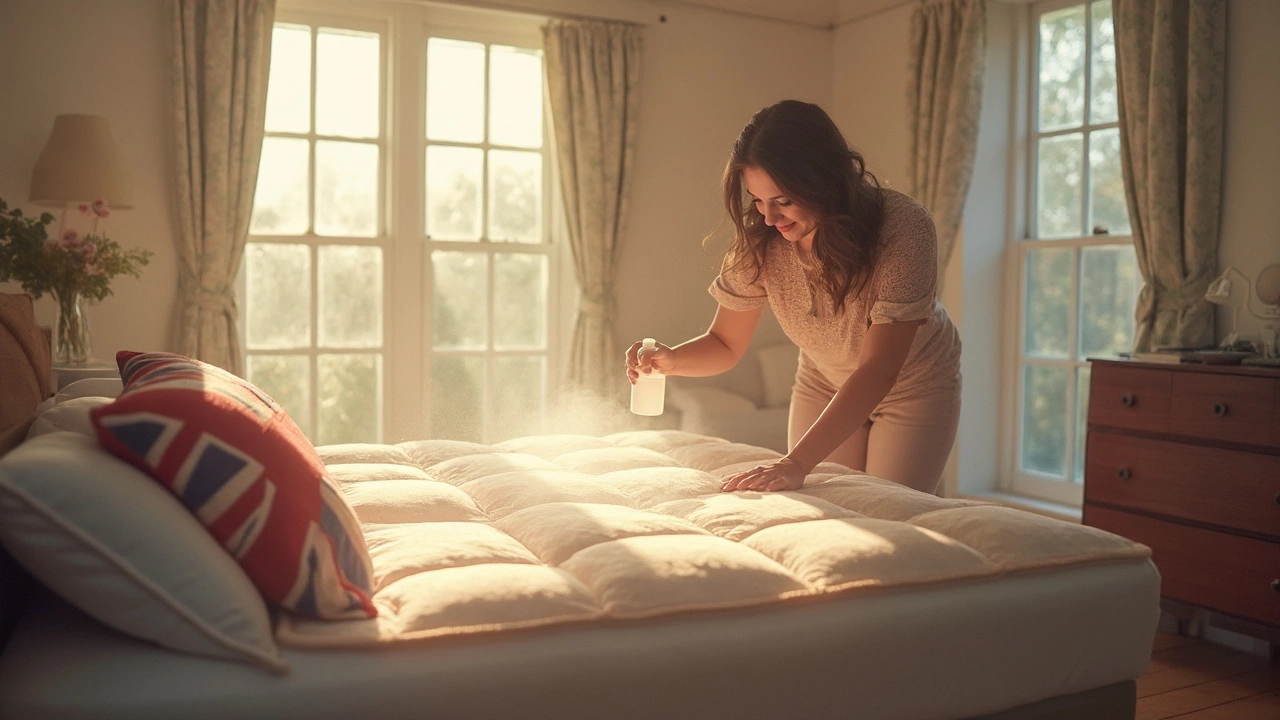If you're staring down at a stain on your mattress and a bottle of vinegar in your hand, you're in the right place. A lot of folks swear by vinegar as a household cleaner, and it really does tackle some cleaning jobs that store-bought stuff can’t. For mattresses, vinegar actually helps break down stains and nukes a lot of funky smells—especially from sweat or the kind of spills you’d rather forget about.
Why does vinegar work? It’s acidic, so it cuts through grime without harsh chemicals. If you spot a fresh stain, vinegar can keep it from setting and make things easier to wipe up. Got an old, stubborn spot? Vinegar is usually strong enough to loosen it up, so you can dab it out with a clean cloth. Plus, dust mites hate it—making vinegar useful if you’re trying to keep allergies in check.
- How Vinegar Works on Mattress Messes
- What Vinegar Can and Can't Clean
- Simple Steps for Using Vinegar Safely
- Dealing with Smells and Drying Time
- Extra Tips for Keeping Mattresses Fresh
How Vinegar Works on Mattress Messes
When people use vinegar to clean, it’s usually white distilled vinegar. That stuff is about 5% acetic acid, which is just strong enough to cut through most of the everyday messes you see on a mattress. That’s sweat, food spills, pet accidents, or even those times you spill coffee during a lazy morning. Vinegar mattress cleaning breaks down stains so they’re way easier to blot out—no need for mystery sprays loaded with chemicals you can’t pronounce.
The cool part? Vinegar changes the pH of the stain. Most nasty things, like mold and some bacteria, need a neutral or slightly basic (higher pH) environment to survive. Vinegar’s acid lowers the pH, making it harder for gunk to stick around or multiply. On top of that, it neutralizes strong odors by chemically reacting with particles in pee, sweat, and spilled drinks.
It isn’t just word of mouth, either. According to a 2023 home cleaning survey, about 79% of folks who tried vinegar as a cleaner kept using it regularly, mainly because it was affordable and surprisingly effective on light stains and smells.
| Common Mattress Mess | How Vinegar Helps |
|---|---|
| Sweat stains | Breaks down proteins for easier cleaning |
| Urine odors | Neutralizes ammonia smell at the source |
| Food/drink spills | Lifts sugars and sticky residue |
| Dust mites | Creates environment where they can’t thrive |
Don’t expect vinegar to kill off everything—like serious mold infestations or viruses—but for normal messes, it holds up. It's simple, cheap, and a lot safer than most chemicals you might be tempted to spray on something you sleep on every night.
What Vinegar Can and Can't Clean
Vinegar isn’t a magic cure-all for mattress messes, but it’s pretty handy against a lot of regular problems. Most folks use white distilled vinegar for cleaning, and that’s your best bet for safe, no-fuss results. But it helps to know where it shines and where you’ll need something stronger.
Here’s what vinegar is good at:
- Busting fresh stains from drinks, sweat, or pets—it stops them from settling in.
- Killing off a fair bit of surface bacteria and dust mites, which really helps if you’ve got allergies.
- Neutralizing common odors like sweat and that musty smell mattresses sometimes pick up over time.
But there are limits. Vinegar can’t do much about:
- Deep, old stains—think year-old wine spills or ink. These usually need a stronger cleaner or professional help.
- Mold or heavy mildew. Vinegar might slow mold, but it won’t kill it off completely the way mold sprays or hydrogen peroxide can.
- Urine stains that have sunk deep into mattress layers. Vinegar works on surface-level spills, but below that, the smell can stick around without something stronger.
- Some mattress fabrics that don’t like acid—memory foam especially. Too much vinegar can damage the material or mess with foam firmness, so spot test first.
If you want the numbers, take a look at this:
| Problem | Vinegar Success Rate | Notes |
|---|---|---|
| Fresh Food/Drink Stains | 80% effective | Works quickly, dab—don’t rub |
| Surface Odors | 85% effective | Neutralizes with no chemical smells |
| Dust Mites | 70% reduction | Light spray, let dry completely |
| Deep Mold | 20% effective | Needs professional cleaning |
| Vinegar mattress cleaning (general) | Good for basic upkeep | Always spot test first |
Long story short: vinegar is a solid option for everyday messes on most mattress types. If you’ve got a real disaster on your hands—like black mold or a massive, old stain—vinegar might not be enough to save your mattress.

Simple Steps for Using Vinegar Safely
If you want to ditch weird stains and stale smells, but also want to keep your mattress in good shape, a little know-how goes a long way. There’s no need to drown your mattress—less is more here. You’ll want to mix the right solution, use the right technique, and dry things out fast.
- Mix the solution right: Go for a half-and-half mix of white vinegar and water. If you want some extra cleaning power, add a tiny squirt of mild dish soap. Skip apple cider or any flavored vinegars—they can leave stains or an odd scent.
- Spot test first: Find a spot that’s not obvious (like the side or foot of the mattress). Dab on a little mix and wipe after a minute. Wait for it to dry. If you see no color change or weird marks, you’re good.
- Spray, don’t soak: Pour your mix into a spray bottle. Mist the nasty spot lightly—don’t drench the mattress. Too much liquid might mean mold later.
- Blot, don’t scrub: After you spray, blot the spot with a clean towel. Scrubbing could hurt the mattress fabric and push the mess deeper inside.
- Let it air out: Open a window or turn on a fan. Make sure the spot dries all the way. If you have baking soda, sprinkle some on after you blot. Vacuum it up after an hour for extra odor-fighting power.
Here’s a handy table for what to use and what to skip when you clean your mattress with vinegar:
| Do Use | Don’t Use |
|---|---|
| White distilled vinegar | Apple cider or cleaning vinegar (too strong) |
| Spray bottle for easy misting | Soaking or pouring directly onto mattress |
| Clean towels for blotting | Harsh brushes (they break the fabric) |
| Mild dish soap (optional) | Bleach or strong chemicals (can ruin mattress) |
When you’re aiming for vinegar mattress cleaning, a little effort goes a long way. Always make sure your mattress is totally dry before putting sheets or covers back. A damp mattress traps odors and might cause mold, which nobody wants where they sleep.
Dealing with Smells and Drying Time
One concern with using vinegar on your mattress is the smell. Vinegar has a sharp odor that can hang around for a while if you don’t handle things right. The good news is, most of the scent goes away as it dries. White distilled vinegar is especially good for cleaning because it doesn’t leave sticky residues or weird colors, but give your mattress enough time to air out unless you want your bed smelling like salad dressing.
If you’re worried about that lingering sourness, crack a window or run a fan to speed things up. Most folks notice the vinegar smell vanishes in a few hours—sometimes less—if there’s good airflow. You can also sprinkle a little baking soda over the spot after cleaning to help soak up leftover odors and any extra moisture. Let the baking soda sit for at least 30 minutes before vacuuming it up.
According to the Environmental Protection Agency, "Proper ventilation while using vinegar as a cleaner not only lowers smell faster but can also improve indoor air quality."
"Natural products like vinegar are best paired with fresh air—it speeds up the chemical breakdown and gets your home back to normal quicker," says the EPA's Healthy Cleaning tips page.
Here’s the best way to make sure your mattress dries right:
- Blot the spot with a dry towel after cleaning—don’t rub or you might just spread things around.
- Open windows or turn on a fan. Never let the mattress stay damp—mold loves moisture.
- Keep pets and kids off the bed until it’s completely dry.
Using vinegar mattress cleaning isn’t risky if you stick to light sprays and avoid soaking the fabric. Always test on a hidden corner before going big—some mattresses hold onto moisture longer than others. If your mattress still smells funny after a day, repeat the baking soda step or give it another day of airing out. The goal: a clean bed that doesn’t reek of vinegar or anything else.

Extra Tips for Keeping Mattresses Fresh
Keeping your mattress clean isn’t just about tackling one-off stains. Staying on top of the little stuff goes a long way. First things first: always use a mattress protector. It’s like a raincoat for your bed—blocks sweat, spills, and even dead skin from soaking in. Most decent ones are machine washable, so toss them in every month or so.
Don’t forget to vacuum your mattress. Seriously, it helps a ton. Use the upholstery attachment and get into all the corners and creases. This sucks up dust mites, dead skin, and crumbs that attract bacteria. Hit it once a month if you want to keep things really fresh.
Let your mattress breathe! Every once in a while, strip off all the bedding and open up your windows. Sunlight helps kill off germs and keeps things from getting musty. If your mattress is double-sided, flip or rotate it a few times a year. That keeps the wear even and stops sagging spots.
If you’re worried about ongoing smells or want to keep things extra clean, sprinkle baking soda over the top. Leave it for at least 30 minutes before vacuuming it up. This kills off weird odors and leaves things feeling new. Don’t mix vinegar mattress cleaning with baking soda at the same time—it bubbles up and makes a mess.
People usually keep their mattresses for 6 to 8 years, but that doesn’t mean you have to deal with a gross one the whole time. Here’s a quick snapshot of what really matters in keeping your bed fresh:
| Tip | How Often | Why It Works |
|---|---|---|
| Wash bedding and protector | Every 1-2 weeks | Removes sweat, skin cells, dirt |
| Vacuum mattress | Monthly | Cuts down on dust mites and allergens |
| Air out mattress | Every 2-3 months | Fights odors and moisture build-up |
| Spot clean stains | As needed | Stops stains from setting in |
| Rotate/flip mattress | Every 3-6 months | Prevents uneven wear and sagging |
Stick to these habits, and your mattress will feel—and smell—a whole lot better, every single night.
